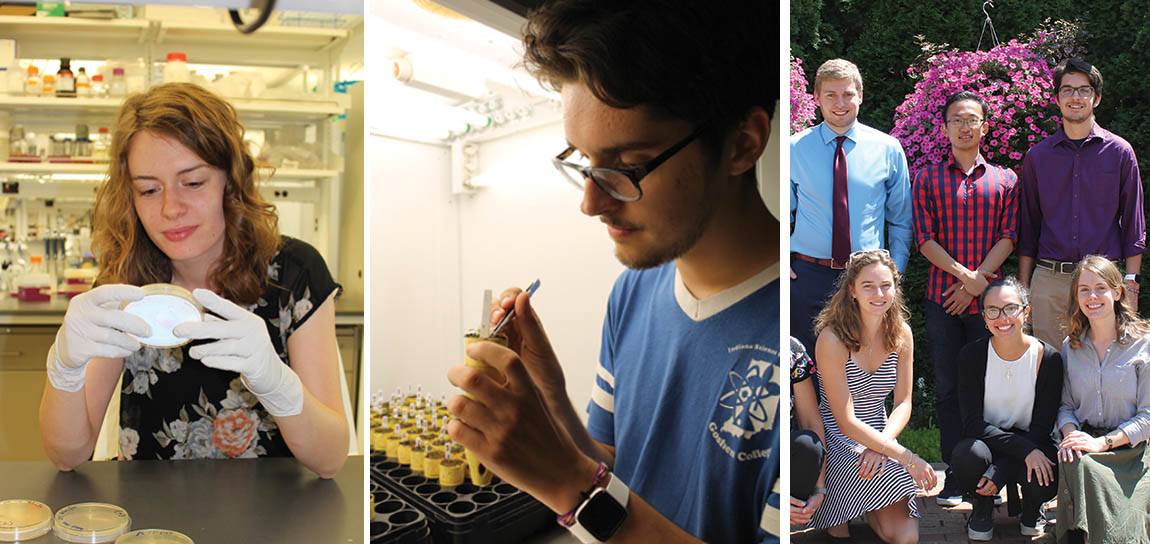Summer Undergraduate Research Program - MSU

Through GLBRC’s Summer Undergraduate Research Program (SURP) at Michigan State University (East Lansing, MI), students are engaged in a research program across multiple disciplines, including biochemistry, plant biology, genetics, microbiology, ecology, and crop sciences. The summer program students will:
- Join a dynamic group of students and faculty for a unique research experience.
- Learn the process of research: reading literature, formulating questions and hypotheses, designing a study, collecting and analyzing data, and presenting your results as a research poster and presentation.
- Participate in lab group meetings and attend research seminars.
- Explore if bioenergy research is a right fit for them.
- Attend field trips to learn more about the integrated bioenergy research at GLBRC.
- Build references for your application to graduate school or other professional programs.
- Participate in professional development seminars that will prepare you to think broadly about STEM career options.
Please note the application process is facilitated by the Plant Genomics REU program.
Summer 2026 Program: Apply here now!
2025 MSU SURP Host Labs
Project #1
Mentor: Sang-Jin Kim
Project description: The main goal of our summer research project is to evaluate Mixed-Linkage Glucan (MLG) in genetically modified sorghum. Utilizing the first generation of MLG-engineered sorghum lines through synthetic biology and CRISPR technology, we will estimate MLG content, biomass production, and programmed gene expression. This work will include monitoring growth, conducting biochemical plant cell wall analysis, genotyping sorghum transgenic lines, and engaging in molecular cloning. This integrated work aims to provide a complete overview of plant engineering, including fieldwork experience and the opportunity to discover various lab techniques.
Project #2
Mentor: Dae Kwan Ko
Project description: The Summer Undergraduate Research Program project is designed to introduce students to a range of plant genomics tools while providing hands-on training in computational biology. After completing the initial training, the mentee will apply their skills to analyze real datasets, addressing biological questions aligned with the team’s research interests. No prior experience in bioinformatics is required. In addition to computational work, the student will have the opportunity to engage in wet-lab experiments, including sampling, DNA extraction, and PCR analyses, under the mentorship and support from team members.
Mentors: Jinho Lee and Maxwell Oerther
Project description: One of the research focuses of our team are interactions between plant roots and soil structure, and the impact of such interactions on soil carbon sequestration and soil microbial communities. In this project we will collaborate with Lebeis lab in studying the impact of microbial community composition on root architecture. During the summer, we will jointly conduct a greenhouse study exploring how presence of microbial communities that differ in their ACC-deaminase activity within the soil will affect root architecture of switchgrass plants. Our team’s work will include root image collection and root image analyses using root imaging tools, X-ray computed tomography, and image analyses tools. Thus, this project will be focused on gaining exposure to and experience in image analyses, along with gaining some soil and enzymatic activity measurement experiences.
Mentors: Imani Pascoe and Keara Grady
Project description: Our team is interested in plant-microbe interactions, particularly those that promote plant growth. This project will investigate how beneficial bacteria and fungi change switchgrass root architecture through their ability to produce an enzyme, ACC-deaminase, which degrades the precursor of the plant hormone ethylene. We have developed two microbial communities that differ in their ACC-deaminase activity. We will collaborate with the Kravchenko lab to set up this greenhouse experiment, which will measure ACC concentration and microbial community composition. Techniques that can be mastered include plant growth, general molecular biology, metabolomics, and amplicon sequencing.
For additional information about the program, contact Pavani Tumbalam (tumbala1(at)msu(dot)edu).
Read about the experience of previous GLBRC SURP participants here.